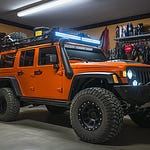When it comes to overlanding and camping, a rooftop tent can completely transform your outdoor experience. Elevated above the ground, away from critters, and with an incredible view of nature, rooftop tents (RTTs) provide comfort and convenience that traditional ground tents often lack. But with so many options on the market, how do you choose the right rooftop tent for your adventures? Here’s a detailed guide that compares different types of rooftop tents, including their pros and cons, to help you make an informed decision
Types of Rooftop Tents
Rooftop tents come in two main types: Soft-Shell and Hard-Shell. Each type has its own advantages and considerations, depending on your camping style, vehicle type, and budget.
1. Soft-Shell Rooftop Tents
Soft-shell rooftop tents are the classic style that most people picture when they think of an RTT. These tents are typically covered in a fabric shell that unfolds, creating a spacious tent and often an extended annex or awning.
Pros:
Affordability: Soft-shell tents are generally more affordable than hard-shell models, making them a great entry point for those new to overlanding.
Spaciousness: They tend to offer more space, with room for up to four people, depending on the model. Many also feature a fold-out section that extends beyond the vehicle, providing additional living space.
Versatility: Soft-shell tents are often designed with annexes or awnings, which offer extra space for changing, storing gear, or creating a sheltered cooking area.
Cons:
Longer Setup Time: Soft-shell tents take a bit longer to set up and pack away compared to hard-shell tents. Although it's not a huge difference, it can be less convenient, especially in bad weather.
Less Aerodynamic: When folded, soft-shell tents tend to have a larger profile, which can create more drag and reduce fuel efficiency.
Durability Concerns: The fabric outer shell is susceptible to wear and tear over time, especially with frequent exposure to wind, rain, and UV rays.
Best For: Campers looking for an affordable, spacious option that offers versatility for families or larger groups.
2. Hard-Shell Rooftop Tents
Hard-shell rooftop tents feature a solid shell that encloses the tent when it's not in use. When deployed, the hard shell forms a roof or a base, depending on the design. They come in two main types: pop-up and clamshell.
Pros:
Quick Setup: Hard-shell tents can be set up in minutes—just unlatch the shell, and the tent pops open. This is a huge benefit when arriving at camp late or dealing with bad weather.
Aerodynamics: Hard-shell tents have a sleek, aerodynamic design, which results in less wind resistance and improved fuel efficiency compared to soft-shell models.
Durability: The hard outer shell provides excellent protection from the elements when closed, ensuring better durability over time.
Weather Resistance: Hard-shell tents are typically more resistant to wind and rain, providing a more secure shelter in adverse conditions.
Cons:
Higher Cost: Hard-shell tents are generally more expensive than soft-shell tents, which may put them out of reach for some campers.
Limited Sleeping Space: Most hard-shell models are designed for two people, so they may not be ideal for families or groups needing extra space.
Best For: Solo travelers or couples looking for a quick setup, excellent durability, and an aerodynamic profile that’s ideal for long-distance travel.
Considerations When Choosing a Rooftop Tent
1. Vehicle Compatibility
Not every tent is compatible with every vehicle. Make sure your vehicle's roof rack or crossbars are rated to handle the weight of the tent as well as the occupants. Larger SUVs and trucks are generally the best candidates for rooftop tents, but smaller vehicles can often accommodate lighter models.
2. Size and Sleeping Capacity
Consider how many people will be sleeping in the tent. Soft-shell tents are ideal for families or groups of three or four, while hard-shell tents are better suited for one to two people. Some tents also have weight restrictions that may limit their capacity.
3. Weather Resistance
If you’re planning to camp in extreme weather conditions, hard-shell tents are the better option due to their resistance to heavy wind and rain. Soft-shell tents, however, can offer more ventilation for camping in warm weather.
4. Setup Time
Hard-shell tents are much quicker to set up and pack down compared to soft-shell models. If you plan on moving camp frequently, the convenience of a hard-shell tent may be worth the extra investment.
5. Budget
Soft-shell tents are more budget-friendly, making them accessible for a wider range of adventurers. Hard-shell tents, while more costly, offer added convenience, durability, and ease of use that may be worth the extra expense for some.
Popular Rooftop Tent Models
1. Tepui Explorer Kukenam 3 (Soft-Shell)
Capacity: 3 people
Highlights: Spacious interior, rugged construction, and includes a high-density foam mattress.
Price Range: $$
2. CVT Mt. Denali Pioneer (Soft-Shell)
Capacity: 4+ people
Highlights: One of the largest soft-shell tents available, includes an annex for additional space, ideal for families.
Price Range: $$$
3. Roofnest Falcon (Hard-Shell)
Capacity: 2 people
Highlights: Sleek and aerodynamic, quick setup, and built with durable materials.
Price Range: $$$$
4. iKamper Skycamp 3.0 (Hard-Shell)
Capacity: 4 people
Highlights: Spacious enough for a family, with a quick setup and a hard-shell exterior for added protection.
Price Range: $$$$
Final Thoughts
Choosing the right rooftop tent comes down to your specific needs, budget, and camping style. Soft-shell tents are perfect for those looking for an affordable, spacious option with lots of versatility, while hard-shell tents offer quicker setups, better durability, and a more aerodynamic design for those on the move. By considering your vehicle, the number of campers, and the types of conditions you’ll be facing, you can find the perfect rooftop tent to elevate your camping experience.
No matter which rooftop tent you choose, one thing’s for sure—sleeping above the ground, under the stars, is an adventure worth having. So pick your tent, pack your gear, and hit the trails. Happy camping! 🌌🚙🏕️













